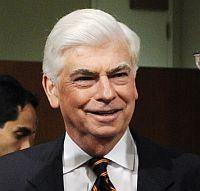 Influential United States Senator Christopher Dodd of Connecticut, the new Democratic co-chair of the reconstituted US Senate India Caucus, who took over from the erstwhile Senator and now Secretary of State Hillary Clinton, in welcoming Prime Minister Dr Manmohan Singh to Washington, has said, "That President Obama chose the visit of Indian Prime Minister Singh as the occasion for the first State Dinner of his administration should come as no surprise."
Influential United States Senator Christopher Dodd of Connecticut, the new Democratic co-chair of the reconstituted US Senate India Caucus, who took over from the erstwhile Senator and now Secretary of State Hillary Clinton, in welcoming Prime Minister Dr Manmohan Singh to Washington, has said, "That President Obama chose the visit of Indian Prime Minister Singh as the occasion for the first State Dinner of his administration should come as no surprise."
Dodd, one of the senior-most members of the powerful Senate Foreign Relations Committee, in an exclusive op-ed article for next week's issue of India Abroad -- the newspaper in the US owned by rediff.com -- declared, "The Prime Minister's visit is the latest sign that the relationship between our two countries has become increasingly close -- and increasingly important."
He said that 'as co-chairman of the Senate India Caucus, I have the privilege of working with Democrats and Republicans alike to develop this bond,' and recalled that 'one key moment in the history of our relationship came last year, when our two nations worked together to forge an agreement on civil nuclear cooperation.'
Dodd, who will be one of eight Senators, who constitute part of the Senate leadership, who will call on Prime Minister Singh on the morning of November 23 in his suite in the Willard Inter-Continental and will once again meet Dr Singh at the State banquet in the South Lawn of the White House on November 24, said, "It took hard work on both sides of the world," to finally see the consummation of this US-India nuclear deal legislation.
"In the Senate," he said, "I was proud to shepherd the legislation on behalf of my friend -- and now the US Vice President -- Joe Biden. And, in India, Prime Minister Singh showed courageous leadership, putting himself and his political party on the line to come to the table."
The lawmaker, in his article in India Abroad, said, "This agreement accomplished more than simply laying to rest an issue that had long been a divisive one between our two countries. It symbolized the changing role India has come to play on the world state and laid the groundwork for future cooperation."
Dodd, chairman of the Senate Banking Committee, which has been in the thick of the sub-prime lending crisis that ultimately led to the recession in the country, said, "As an emerging global power, India has faced crossroads. Long proud of its geopolitical independence, India's growing economic and strategic importance has forced it to think long and hard about what kind of global power it wants to be."
"India has chosen to become a partner -- a cooperative and integral player in a global and interdependent future," he said, "And, that choice makes great things possible."
Dodd continued, "India has become a key bulwark of democratic values, a trusted friend to America, and now, an important ally in addressing global challenges."
He predicted that 'working together, we can forge global consensus on key issues that affect everyone. We can tackle challenges like disease, poverty, and global climate change.'
"We can encourage our respective institutions of research and higher education to join forces to find new energy technologies and make medical breakthroughs. We can expand opportunities for broader political and social exchanges, not to mention economic investment."
Dodd added, "And, we can continue to create individual success stories like the ones lived by the many Americans on Indian descent who have become part of the rich fabric of Connecticut and the United States."
Talking about his own Indian American constituents, the lawmaker said, "The economic and cultural contributions of Americans of Indian descent living in Connecticut can be seen in our schools, our hospitals, and our communities."
Dodd acknowledged that 'when we think about foreign policy, we often find ourselves considering our approach to global competitors and international threats,' but argued that 'just as critical as how we deal with our adversaries is how we work to strengthen the bonds we have with our friends.'
He recounted how 'many Indian Americans have told me that they sometimes feel like children of divorced parents, caught between the land of their birth and the land where they chose to settle and raise their own families.'
"Now, our two countries are working together more closely than ever," he said."
However, Dodd pointed out that this didn't mean 'our work is done -- rather, it means that the important work of teaming up to address global challenges can begin.'
He pledged, "As a senior member of the Foreign Relations Committee, I will continue to challenge both countries to make further progress," and that in his capacity 'as chairman of the Senate India Caucus, I will work to build on the relationship that has brought so much to our country and our state.'
"And, as an American," Dodd said, "I welcome Prime Minister Singh and look forward to working to advance our strong friendship in the years ahead," he added.
Image: Senator Christopher Dodd
Photograph: Reuters








